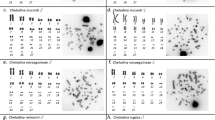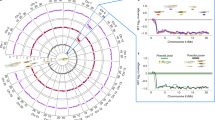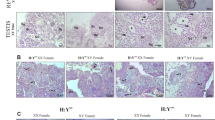Abstract
MOST fishes have morphologically undifferentiated sex chromosomes and sex determination is believed to be under gene control, probably through the production of alternative enzymes1. The idea that differentiation of fish sex chromosomes is usually relatively primitive has been supported by genetic experiments involving, for example, sex reversals and gynandromorphisms2. Recently, however, sex chromosomes of the XX–XY, XX–XO, and WZ–ZZ types2–4, as well as multiple sex chromosomes5,6, have been documented in certain groups of fishes. Thus, fishes seem to display various cytological sex-determining mechanisms, some primitive, others elaborately specialized.
This is a preview of subscription content, access via your institution
Access options
Subscribe to this journal
Receive 51 print issues and online access
$199.00 per year
only $3.90 per issue
Buy this article
- Purchase on Springer Link
- Instant access to full article PDF
Prices may be subject to local taxes which are calculated during checkout
Similar content being viewed by others
References
Mittwoch, U., Sex Chromosomes (Academic Press, New York, 1967).
Chen, T. R., thesis, Yale Univ. (1967).
Chen, T. R., Postilla, 130, 1 (1969).
Chen, T. R., and Ebeling, A. W., Chromosoma, 18, 88 (1966).
Uyeno, T., and Miller, R. R., Nature, 231, 452 (1971).
Uyeno, T., and Miller, R. R., Experientia, 28, 223 (1972).
Zech, L., Expl. Cell Res., 58, 463 (1969).
Vosa, C. G., Chromosoma, 30, 366 (1970).
Barlow, P., and Vosa, C. G., Nature, 226, 961 (1970).
Pearson, P. L., Bobrow, M., and Vosa, C. G., Nature, 226, 78 (1970).
Sumner, A. T., Robinson, J. A., and Evans, H. J., Nature new Biol., 229, 231 (1971).
Denton, T. E., and Howell, W. M., Copeia, 2, 392 (1969).
Howell, W. M., Copeia, 1, 191 (1972).
Breg, W. R., Stain Technol., 47, 89 (1972).
Foley, J. O., Biol. Bull., 50, 117 (1926).
Comings, D. E., Expl. Cell Res., 67, 441 (1971).
Caspersson, T., Farber, S., Foley, G. E., Kudynowski, J., Modest, E. J., Simonsson, E., Wagh, U., and Zech, L., Expl. Cell Res., 49, 219 (1968).
Ellison, J. R., and Barr, H. J., Chromosoma, 36, 375 (1972).
Madhabananda, S., and Stumpf, W. E., Science, 179, 389 (1973).
Retief, A. E., and Van Miekerk, W. A., Lancet, ii, 270 (1971).
Atz, J. W., in Intersexuality in Vertebrates Including Man (edit. by Armstrong, C. N., and Marshall, A. J.), 145 (Academic Press, London, 1964).
Applegate, V. C., Copeia, 2, 92 (1943).
Author information
Authors and Affiliations
Rights and permissions
About this article
Cite this article
HOWELL, W., BLOOM, S. Sex-associated Differential Fluorescence of Mudminnow Chromosomes and Spermatozoa. Nature 245, 261–263 (1973). https://doi.org/10.1038/245261a0
Received:
Revised:
Issue Date:
DOI: https://doi.org/10.1038/245261a0
This article is cited by
-
Localisation of NORs and counterstain-enhanced fluorescence studies inPerca fluviatilis (Pisces, Percidae)
Genetica (1985)
-
Structural characteristics of genome organization in amphibians: Differential staining of chromosomes and DNA structure
Journal of Molecular Evolution (1982)
-
New developments in vertebrate cytotaxonomy III. Karyology of bony fishes: A review
Genetica (1981)
Comments
By submitting a comment you agree to abide by our Terms and Community Guidelines. If you find something abusive or that does not comply with our terms or guidelines please flag it as inappropriate.



